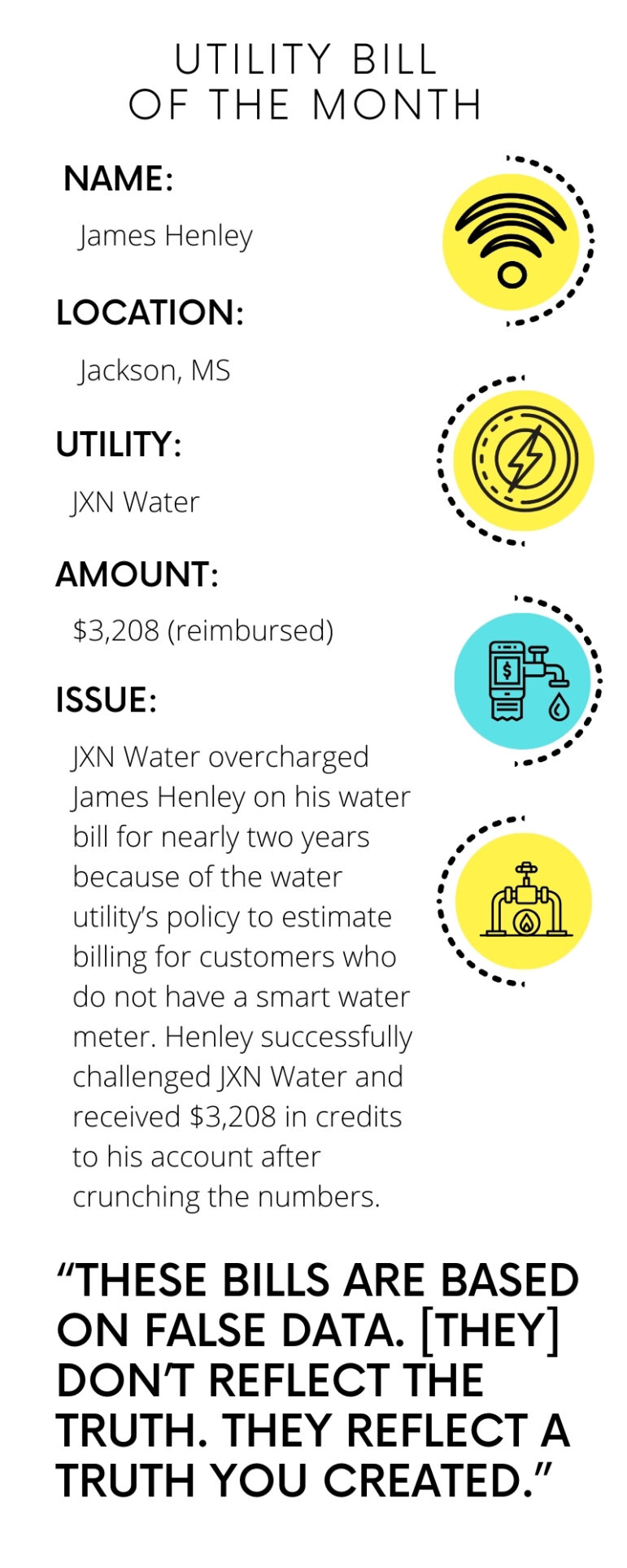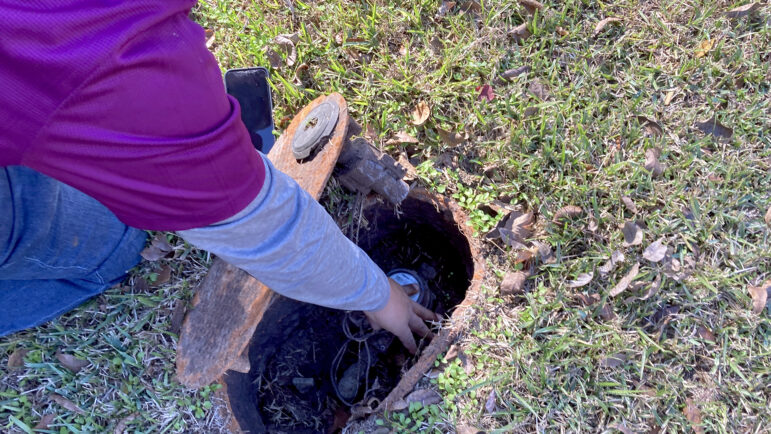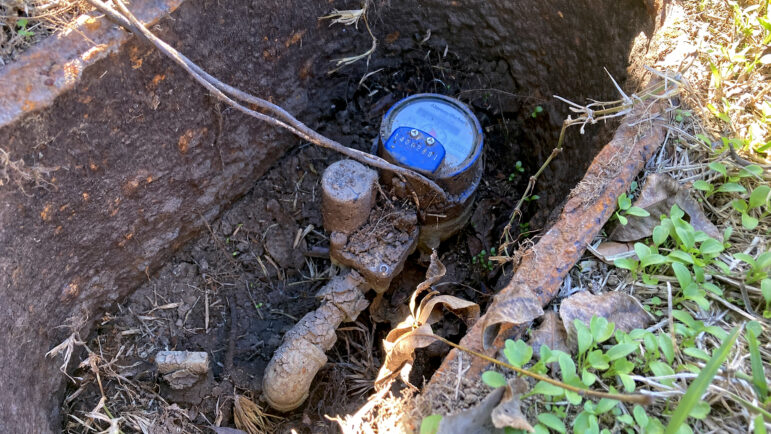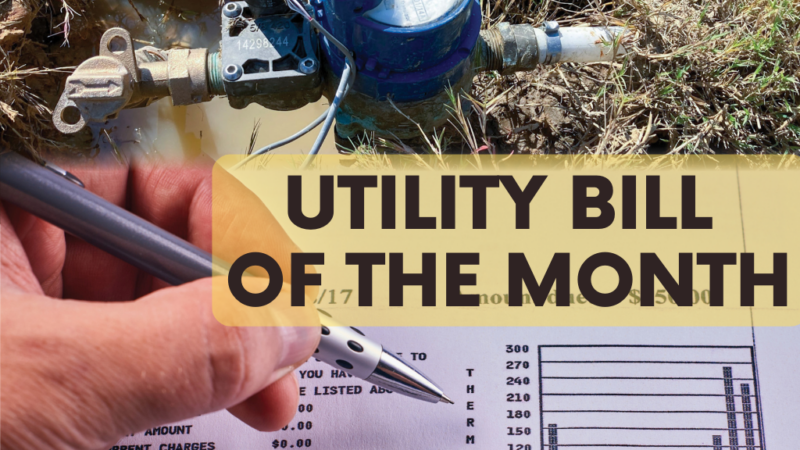Jackson estimated his water bill and overcharged him by thousands. He fought back and won
This story is part of a crowdsourced project investigating utility billing issues in Alabama, Louisiana and Mississippi. Do you have a utility bill you’d like us to look into? Submit it here, and with your permission, we may use it in one of our monthly features.

To properly understand a water bill, it can feel like you need to be a certified accountant or a lawyer. Luckily for James Henley, he’s both.
His home city of Jackson, Mississippi, is notorious for issues with drinking water, and it also has a long history of inaccurate and missing bills.
Henley wanted to show how unreliable the bills from JXN Water, which runs the water system, could be. So, he used his nearly three decades of legal and accounting experience to prove that the water utility overcharged him by thousands of dollars for two years.
After successfully getting JXN Water to credit him that money back in November, he’s now helping other Jackson residents and businesses fight for their own accurate water bills.
His social media post about his bill — and his triumph — in November was so popular that he could have added another title to his résumé.
“It got so many reads that Facebook sent me something that said I could become an influencer if I wanted to,” Henley said while laughing. “That was hilarious.”
The failures of Jackson’s water system go well beyond the attention-grabbing water crisis that left the entire city without safe tap water for nearly two months. College-aged Jackson residents have dealt with boil water notices their whole lives.
“Most people in Jackson have never drank Jackson water,” Henley said of the lingering issues. “They bought bottled water. You would bathe in it, you would cook with it and you would wash your dishes with it. But you couldn’t really do that anymore either.”
The billing issues can cause shock when customers eventually get a huge bill with months — or, in some cases, years — of charges built up. And the already underfunded water system is harmed by going so long without that needed revenue from those bills. New water meters meant to solve the billing problems in 2013 have only made them worse.
To solve these issues, a district judge appointed a third-party manager, Ted Henifin, to run Jackson’s water system in 2022.
Henifin now says the city’s water system is “light years” ahead of where it was. JXN Water has been installing new water meters throughout the city and recently announced a new rate structure for 2024 that lowers bills for customers who receive Supplemental Nutrition Assistance Program (SNAP) benefits, better known as food stamps.
But this progress has come with at least one drawback. Henifin promised the return of water shutoffs for customers who aren’t paying their bills — something that hasn’t happened on a large scale since 2015. After being notified, customers will have 10 days to pay or set up a repayment plan before JXN Water cuts off their service. Less than 60% of customers were paying their water bills in the fall, according to the company.”
“It’s a terrible tool,” Henifin said of using shut-offs as a way of making sure JXN Water is collecting money. “But I don’t think we’ve got an easy way to do that in Mississippi. We’re a cash-starved utility.”
JXN Water initially scheduled this policy to start in September before it got pushed back to the start of 2024. January’s winter weather further delayed it.
When Henley heard this news, he was not in danger of having his water cut off, but it inspired him to look at his own bills and use his forensic accounting background to challenge JXN Water — first for himself, and then for those who don’t know how.
“When I heard that they were saying, ‘We’re going to start cutting off poor people’s water because they haven’t paid these extravagant bills that we sent them,’ I sat down and said, ‘Well, that doesn’t make any sense,’” Henley said. “That’s when I went to work.”
‘These bills are based on false data’

While his law degree and accounting certification would help Henley challenge his bills, it doesn’t take either to see the amount he was being charged was way too much.
JXN Water charged Henley about $160 monthly for a one-story house. That seemed suspicious because he rarely ran water here. He used the house as his law office, going in about twice a week — no dishes, no showers and only the occasional flushed toilet and washed hands. The roughly 12,000 gallons listed on his bill seemed impossible.
And there was more reason to believe that the amount was wrong: the 12,000 gallons listed were not based on any measurement at the office. Instead, it was an estimate.
Water providers often use estimates because they don’t have enough workers to manually read each customer’s meter to gauge water use. This issue is why New Orleans’ water utility only checks meters every other month until smart water meters that can do the job automatically get installed.
Jackson is taking it a step further — estimating the bills of all customers with outdated meters. In a letter to customers sent last fall, JXN Water said the average Jackson family was using about 150 gallons of water per day, according to the new meters, and estimates would be based on that statistic.
Estimated bills can help patch a troubled water system, but overreliance on them leads to other issues. A bad leak can go undetected without regular, accurate readings leading to bills in the thousands of dollars. Even systems, like New Orleans’, that alternate between accurate and estimated bills can hide expensive leaks.
That wasn’t the case for Henley. JXN Water said his bill was based on what other customers with new meters were using, but Henley said those estimates did not match his water use.
“These bills are based on false data,” Henley said. “[They] don’t reflect the truth. They reflect a truth you created.”
JXN Water said it will only cut off water to customers with accurate bills based on the new meters, not customers still receiving estimated bills. According to the company, 98% of customers had new meters installed by the start of the year. Henley, however, said he’s in the 2% that’s still waiting for theirs.
The search for equity

One of Henifin’s toughest tasks for JXN Water has been figuring out how to increase the water utility’s revenue without causing further pain to residents who can’t afford a rate hike.
He proposed basing water rates on property value as a solution. Those with higher property values pay more, while those with lower pay less — creating a more equitable system, Henifin said.
But the size of someone’s property doesn’t always match their wealth, income or water usage.
“It’s a mistake to make that correlation,” Ahmed Rachid El-Khattabi, associate director of the Environmental Finance Center at the University of North Carolina Chapel Hill, said. “To draw a line between a high-value household and how much a household should be paying for their water bill.”
Mississippi Gov. Tate Reeves squashed Henifin’s plan by signing legislation in April requiring water bills to be based on water usage. Instead, Henifin decided to make the system more affordable for lower-income customers by cutting fees for customers also on SNAP.
The fix

In March 2020, the city of Jackson settled a lawsuit with Siemens Inc. for $89.8 million over faulty water meters the company installed across the city in 2013. The meters led to inaccurate and missing bills for residents and that is why JXN Water is replacing meters across the city.
It took JXN Water workers two days of searching to find Henley’s old meter. Henley said no one from the water utility had read it in years and grass had overtaken it. The company said it’s the customer’s responsibility to keep the meter from being covered.
Henley was in luck, though. His meter worked and was still recording his water usage — an amount significantly lower than his estimated bill.
When he got his first bill based on what he used in November, it was for 37 gallons — far from the 12,000 gallons JXN Water estimated he used two months prior. Instead of paying around the $160 he normally would for the month, the charge on his November bill was for just $16.28.
After seeing his bill, Henley did what any good accountant would do and made a spreadsheet. He crunched the numbers and realized JXN Water owed him $3,208 since October 2021. After sending the analysis to JXN Water, his November bill came with a credit for that amount.
JXN Water disputes Henley’s telling, but would not say what was inaccurate. The company also said Henley’s filming of the meter readers and posts on social media about the issue made the situation more difficult.
Henley shared the news of the credit so others could get their bills fixed.
“I said, ‘Now I’m going to tell everybody else to tell them to come read their water meter and to follow this example,’” Henley said. “I have a text from a guy who said his church got a $3,200 refund from following this logic.”
Along with accountant, lawyer and Jacksonian — and also potential influencer — there’s one more title Henley has: pastor at Fresh Start Christian Church.
He has faith the situation with Jackson’s water will be resolved, thanks to initiatives like the discount for customers who also receive SNAP benefits.
And while he agrees with the utility that people need to pay for the water they use, he wants them to be billed for what they actually use — not an estimate.
“They’re attempting to bill everybody finally,” Henley said. “The problem is how they’re billing them. If they straighten that out, it’s going to get better.”
JXN Water encourages customers with billing issues to call them at 601-500-5200.
This story was produced by the Gulf States Newsroom, a collaboration between Mississippi Public Broadcasting, WBHM in Alabama, WWNO and WRKF in Louisiana and NPR.
40 years after ‘Purple Rain,’ Prince’s band remembers how the movie came together
Before social media, the film Purple Rain gave audiences a peak into Prince’s musical life. Band members say the true genesis of the title song was much less combative than the version presented in the film.
Park Fire in California could continue growing exponentially, Cal Fire officer says
Cal Fire has confirmed that over a hundred structures have been damaged in the Park Fire, which grew overnight near Chico, Calif. Difficult firefighting conditions are forecast through Friday night.
Checking in with Black voters in Georgia about the election, now that Biden is out
Some voters who could be key to deciding who wins Georgia. What do they think about Vice President Harris becoming the frontrunner in the race to be the Democratic nominee?
Tahiti’s waves are a matter of ‘life and death’ for surfing Olympics
Tahiti's Teahupo'o wave has a slew of riders for the Paris 2024 Olympics. NPR finds out why it's called one of the most dangerous waves.
Researchers are revising botanical names to address troubling connotations
Since the mid-1700s, researchers have classified life with scientific names. But some of them have problematic histories and connotations. The botanical community is trying to tackle this issue.
A spectacular opening ceremony wowed a global audience despite Paris’ on-and-off rain
The Paris Olympics opening ceremony wowed Parisians, fans and most everyone who was able to catch a glimpse of thousands of athletes floating down the Seine to officially begin the Games.



